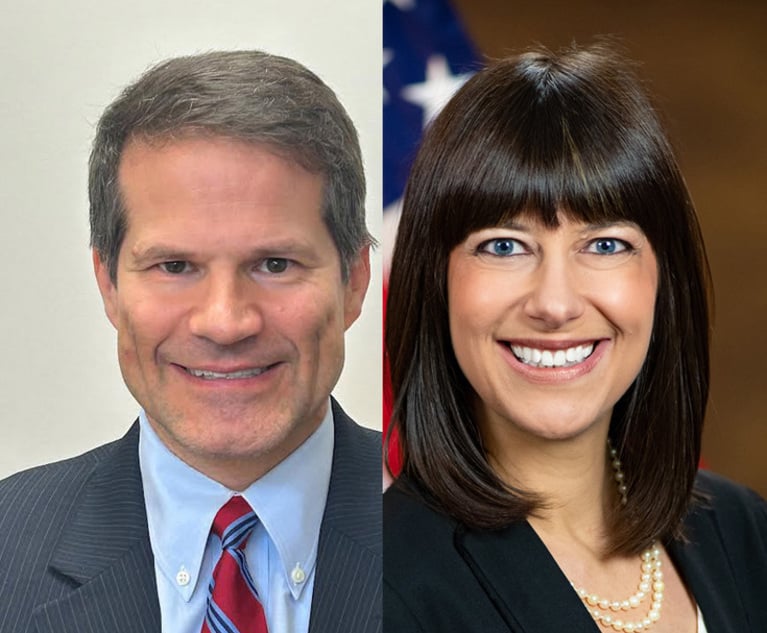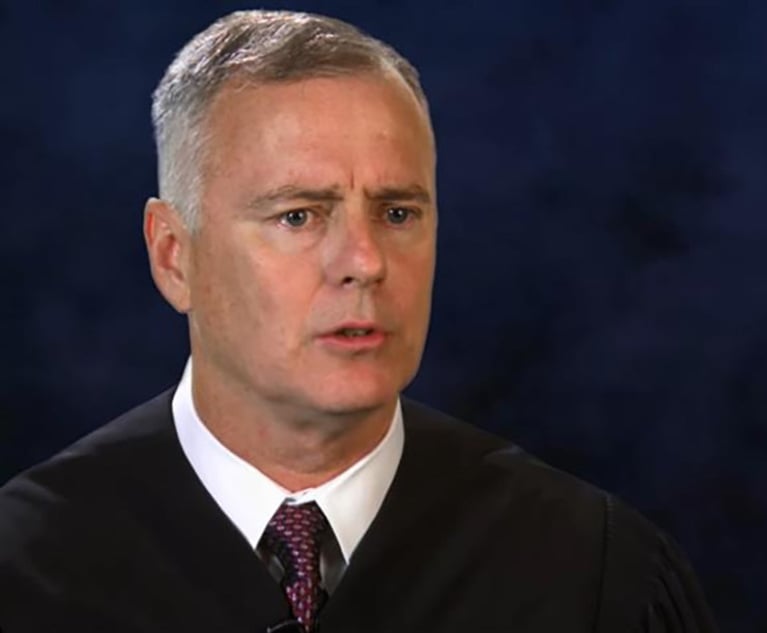What Are People Saying About Senate's New Lit Funding Bill?
The bill would require disclosure of third-party litigation funding in class actions and multidistrict litigation within 10 days of a case filing, or 10 days after a funding deal. It would also require disclosure of financing that provides cash to plaintiffs.
May 14, 2018 at 06:10 PM
6 minute read

A push to reveal litigation funding has spread to the U.S. Senate, where new legislation has drawn a mixture of praise and criticism from plaintiff and defense attorneys.
U.S. Senate Judiciary Committee Chairman Chuck Grassley, along with Republican Sens. John Cornyn and Thom Tillis, introduced the Litigation Funding Transparency Act of 2018 on May 10. The bill would require disclosure of third-party litigation funding in class actions and multidistrict litigation within 10 days of a case filing, or 10 days after a funding deal. It would also require disclosure of financing that provides cash to plaintiffs.
It's more expansive than a bill passed out of the U.S. House of Representatives last year calling for disclosures only in class actions, and more limiting than legislation enacted in Wisconsin requiring disclosure of third-party financing in all types of state court cases there.
The bill comes as a federal rules advisory committee considers such disclosures in multidistrict litigation. Some judges are coming out with their own orders, although those remain rare. U.S. District Judge Dan Polster in Ohio ordered plaintiffs lawyers in the opioid multidistrict litigation on May 7 to disclose third-party financing agreements in camera.
Here's what lawyers, and others, had to say about the latest bill:
Lisa Rickard (president, U.S. Chamber of Commerce's Institute for Legal Reform): “This legislation would pull back the curtain on third parties 'gambling' on the outcome of class action lawsuits and federal multi-district litigation, a practice that turns our courtrooms into casinos and plaintiffs into little more than poker chips. … The LFTA would also help rein in lawsuit lending, where lenders provide 'up-front' cash to individual plaintiffs to cover immediate living or medical expenses during litigation. The loans typically contain sky-high interest rates—sometimes as high as 200 percent—that can leave borrowers with little to no recovery.”
Peter Knudsen (American Association for Justice): “The American Association for Justice opposes this legislation because it is one-sided and unfairly imposes unjustified and resource-draining burdens on individual plaintiffs and their attorneys, none of which are foisted on corporations and their lawyers. The bill also forces the federal judiciary to do unnecessary work which will waste public resources and slow court proceedings for everyone.”
Christopher Bogart (CEO, Burford Capital): “Judge Polster's order smartly addresses the core question of conflicts of interest without creating a potential for discovery detours that cause unnecessary delays and add unfair cost burdens. He also avoids handing defendants an unfair advantage by getting a free look at plaintiffs' financial affairs. By contrast, The Litigation Funding Transparency Act of 2018 … is an example of the wrong way to handle disclosure—mandating broad disclosure to the defendant. No one has come up with any reasonable justification for a general rule requiring plaintiffs to disclose their sensitive financial arrangements to defendants, yet the proposed legislation sets the stage for this to occur.”
Brian Fitzpatrick (law professor, Vanderbilt University Law School): “To be frank, I really don't see what all of the hubbub is about with regard to disclosing these arrangements. Defendants already have to disclose their insurance limits. That gives plaintiffs strategic information that helps in settlement negotiations. This would do much the same for the other side.”
Sean Fahey (Pepper Hamilton): “It's really very simple: The more people that understand what is going on, the more they agree that—at a minimum—more transparency is needed. That is why you see efforts underway simultaneously in the House, in the Senate, on the rules committee. Each is approaching the issue from a slightly different starting point, but in the end, the result will be the same. More people will understand what is going on and safeguards will be put in place to make sure that our system continues to seek justice, not profits.”
Jay Edelson (Edelson PC): “To me, it is similar to the requirement in federal courts that defendants disclose insurance information. My one issue with the proposed statute is that it should not simply be limited to certain categories of cases. If Peter Thiel is funding a series of lawsuits against Gawker, that should be disclosed. Similarly, if a large corporation is using litigation funding, it should have to tell the court about that as well.”
Deborah Hensler (professor, Stanford Law School): “Knowing how much money is available to class counsel to prosecute the action is relevant to the judge's decision to certify a class. Knowing the terms of the funding agreement is relevant to the judge's assessment of the settlement. In my view, neither of these purposes requires disclosure to defendants.”
Lori Cohen (Greenberg Traurig): “This is not about gaining an unfair advantage; to the contrary, this is to ensure fair and balanced litigation and trials. … The courts and parties are entitled to this type of transparency so it is clear who or what is driving certain strategic decisions, including resolution of matters. There should be no wizard behind the curtain cloaked in secrecy where that wizard can potentially cause upheaval for cases, trials or orderly resolution. This is a move in the right direction and should be supported.”
Travis Lenkner (Keller Lenkner): “The Chamber has tried for years to get a disclosure rule through the advisory committee, and they've failed twice, and most recently made the same rule proposal a third time. Not content with that process, here they are getting senators to do their bidding with an unnecessary and over broad disclosure rule that in previous rounds before the rules committee has been dismissed as unnecessary, premature, over broad and more. … The timing is very intentional: It's a clear end run around the rule making process.”
Anthony Sebok (professor, Benjamin N. Cardozo School of Law at Yeshiva University): “I get the feeling that the true purpose of the push for disclosure is purely voyeuristic. They seem to believe that the public has an appetite to learn more about how class actions and MDLs are funded, and who benefits from them (other than the plaintiffs and their lawyers). Maybe so—but why the federal government should pass laws to feed this appetite has to be explained.”
This content has been archived. It is available through our partners, LexisNexis® and Bloomberg Law.
To view this content, please continue to their sites.
Not a Lexis Subscriber?
Subscribe Now
Not a Bloomberg Law Subscriber?
Subscribe Now
NOT FOR REPRINT
© 2024 ALM Global, LLC, All Rights Reserved. Request academic re-use from www.copyright.com. All other uses, submit a request to [email protected]. For more information visit Asset & Logo Licensing.
You Might Like
View All

Trump's Solicitor General Expected to 'Flip' Prelogar's Positions at Supreme Court

Auditor Finds 'Significant Deficiency' in FTC Accounting to Tune of $7M
4 minute read
Texas Court Invalidates SEC’s Dealer Rule, Siding with Crypto Advocates
3 minute readTrending Stories
- 1Gibson Dunn Sued By Crypto Client After Lateral Hire Causes Conflict of Interest
- 2Trump's Solicitor General Expected to 'Flip' Prelogar's Positions at Supreme Court
- 3Pharmacy Lawyers See Promise in NY Regulator's Curbs on PBM Industry
- 4Outgoing USPTO Director Kathi Vidal: ‘We All Want the Country to Be in a Better Place’
- 5Supreme Court Will Review Constitutionality Of FCC's Universal Service Fund
Who Got The Work
Michael G. Bongiorno, Andrew Scott Dulberg and Elizabeth E. Driscoll from Wilmer Cutler Pickering Hale and Dorr have stepped in to represent Symbotic Inc., an A.I.-enabled technology platform that focuses on increasing supply chain efficiency, and other defendants in a pending shareholder derivative lawsuit. The case, filed Oct. 2 in Massachusetts District Court by the Brown Law Firm on behalf of Stephen Austen, accuses certain officers and directors of misleading investors in regard to Symbotic's potential for margin growth by failing to disclose that the company was not equipped to timely deploy its systems or manage expenses through project delays. The case, assigned to U.S. District Judge Nathaniel M. Gorton, is 1:24-cv-12522, Austen v. Cohen et al.
Who Got The Work
Edmund Polubinski and Marie Killmond of Davis Polk & Wardwell have entered appearances for data platform software development company MongoDB and other defendants in a pending shareholder derivative lawsuit. The action, filed Oct. 7 in New York Southern District Court by the Brown Law Firm, accuses the company's directors and/or officers of falsely expressing confidence in the company’s restructuring of its sales incentive plan and downplaying the severity of decreases in its upfront commitments. The case is 1:24-cv-07594, Roy v. Ittycheria et al.
Who Got The Work
Amy O. Bruchs and Kurt F. Ellison of Michael Best & Friedrich have entered appearances for Epic Systems Corp. in a pending employment discrimination lawsuit. The suit was filed Sept. 7 in Wisconsin Western District Court by Levine Eisberner LLC and Siri & Glimstad on behalf of a project manager who claims that he was wrongfully terminated after applying for a religious exemption to the defendant's COVID-19 vaccine mandate. The case, assigned to U.S. Magistrate Judge Anita Marie Boor, is 3:24-cv-00630, Secker, Nathan v. Epic Systems Corporation.
Who Got The Work
David X. Sullivan, Thomas J. Finn and Gregory A. Hall from McCarter & English have entered appearances for Sunrun Installation Services in a pending civil rights lawsuit. The complaint was filed Sept. 4 in Connecticut District Court by attorney Robert M. Berke on behalf of former employee George Edward Steins, who was arrested and charged with employing an unregistered home improvement salesperson. The complaint alleges that had Sunrun informed the Connecticut Department of Consumer Protection that the plaintiff's employment had ended in 2017 and that he no longer held Sunrun's home improvement contractor license, he would not have been hit with charges, which were dismissed in May 2024. The case, assigned to U.S. District Judge Jeffrey A. Meyer, is 3:24-cv-01423, Steins v. Sunrun, Inc. et al.
Who Got The Work
Greenberg Traurig shareholder Joshua L. Raskin has entered an appearance for boohoo.com UK Ltd. in a pending patent infringement lawsuit. The suit, filed Sept. 3 in Texas Eastern District Court by Rozier Hardt McDonough on behalf of Alto Dynamics, asserts five patents related to an online shopping platform. The case, assigned to U.S. District Judge Rodney Gilstrap, is 2:24-cv-00719, Alto Dynamics, LLC v. boohoo.com UK Limited.
Featured Firms
Law Offices of Gary Martin Hays & Associates, P.C.
(470) 294-1674
Law Offices of Mark E. Salomone
(857) 444-6468
Smith & Hassler
(713) 739-1250








